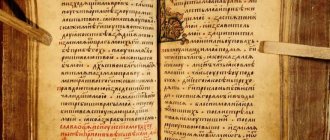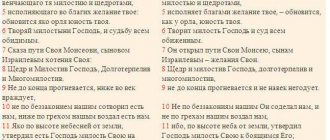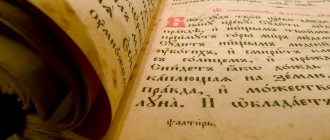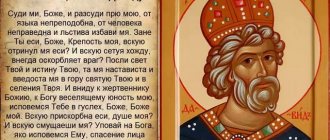The Psalter is a collection of Old Testament songs written at a time when the Jewish people were in despair and oppressed by the powers that be. They praise the Lord and His miracles. Most of the prayers belong to David, as the main founder of this genre.
However, Psalm 84 was written by the Levites, who are descendants of the sons of Korah. In this chant, the authors talk about the difficult lot of God’s chosen people, their sins and requests to God for mercy.
Text of prayer Psalm 84
In Church Slavonic
1 Finally, son of Korah, psalm
2 Thou hast been pleased, O Lord, with Thy land; Thou hast returned the captivity of Jacob:
3 Thou hast forsaken the iniquities of Thy people, Thou hast covered all their sins.
4 Thou hast tamed all Thy wrath; thou hast returned from the wrath of Thy wrath.
5 Bring us back, O God of our salvation, and turn away Your wrath from us.
6 Are you angry with us forever? Or will You spread Your wrath from generation to generation?
7 O God, You will return to revive us, and Your people will rejoice in You.
8 Show us, O Lord, Your mercy, and give us Your salvation.
9 I will hear what the Lord God speaks about me: for He speaks peace against His people, and against His saints, and against those who turn their hearts to Him.
10 Moreover, His salvation is near to those who fear Him, to bring glory to our land.
11 Mercy and truth were met, righteousness and peace were embraced.
12 Truth rose up from the earth, and righteousness came from heaven,
13 For the Lord will give goodness, and our land will yield its fruit.
14 Righteousness will go before Him and set its feet in the way.
In Russian
1 To fulfillment, O children of Korah. Psalm.
2 Lord! You have had mercy on Your land, You have returned the captivity of Jacob;
3 You have forgiven the iniquity of your people, you have covered all their sins,
4 I have taken away all Your wrath, I have turned away the fierceness of Your anger.
5 Restore us, O God of our salvation, and end Your wrath against us.
6 Will you be angry with us forever, will you spread out your wrath from generation to generation?
7 Will You not revive us again, so that Your people may rejoice in You?
8 Show us, O Lord, Thy mercy, and grant us Thy salvation.
9 I will listen to what the Lord God says. He will speak peace to His people and His chosen ones, but let them not fall into folly again.
10 So His salvation is near to those who fear Him, so that glory may dwell in our land!
11 Mercy and truth meet, righteousness and peace kiss each other;
12 truth will arise from the earth, and righteousness will come from heaven;
13 And the Lord will give good, and our land will yield its fruit;
14 righteousness will go before Him and set its steps in the way.
Interpretation of the meaning of church psalm 84
no comments
From the very beginning of the Christian text Psalm 84: “Lord! You have had mercy on Your land, You have returned the captivity of Jacob” (Ps. 84:2) It is not difficult to guess that the time of its writing refers to the period after the exodus of the Jews from Egyptian slavery. It is impossible to more accurately indicate the time of writing, since the psalm no longer contains any chronological clues, further representing a continuous monologue in relation to God, which the author conducts on behalf of the Jewish people.
Various interpretations of Psalm 84, however, boil down to the fact that its authors are the descendants of Korah, who lived during the time of the prophets Zechariah and Haggai.
Orthodox Psalm 84 is a powerful defense against fear
In Psalm 84, the sons of Korah admit that their people committed many sins, repeatedly rejecting God and being ungrateful towards His mercies. They ask God to forgive them and not turn away, regardless of their guilt. Researchers suggest that this mood in the psalm was caused by various disasters that the Jewish people began to experience due to their careless attitude towards the construction of the Jerusalem temple. In Orthodoxy, reading and listening to the text of Psalm 84 is recommended for people who have suffered from violence and, because of this, suffer from attacks of fear.
Listen to the video of the Orthodox prayer Psalm 84 in Russian
Read the text of the prayer Psalm 84 in Russian
To the head of the choir. Korean sons. Psalm.
God! You have had mercy on Your land, You have returned the captivity of Jacob; Forgave the iniquity of Your people, covered all their sins, took away all Your wrath, turned away the fierceness of Your anger. Restore us, O God of our salvation, and end Your wrath against us. Will you be angry with us forever, will you spread your wrath from generation to generation? Will You not revive us again, so that Your people may rejoice in You? Show us, O Lord, Thy mercy, and grant us Thy salvation. I will listen to what the Lord God says. He will speak peace to His people and His chosen ones, but let them not fall into folly again. Thus, His salvation is near to those who fear Him, so that glory may dwell in our land! Mercy and truth will meet, justice and peace will kiss each other; truth will arise from the earth, and righteousness will come from heaven; and the Lord will give good, and our land will yield its fruit; righteousness will go before Him and set its steps in the way.
Orthodox Psalter, text of Psalm 84 in Church Slavonic language
You, O Lord, have favored your land; you have returned captivity to Jacob. You have forsaken the iniquities of your people, you have covered all their sins. You have tamed all your anger, you have returned from the anger of your rage. Bring us back, O God of our salvation, and turn away your wrath from us. Food forever are you angry with us? or will you remit your wrath from generation to generation? God, you turn us into life, and your people will rejoice in you. Show us, Lord, your mercy, and give us your salvation. I will hear what the Lord God says about me; as he speaks peace to his people, and to his saints, and to those who turn their hearts to him. Especially near those who fear him, his salvation will bring glory to our land. Mercy and truth were met, truth and peace were greeted; truth came from the earth, and truth came from heaven; for the Lord will give goodness, and our land will yield its fruit. Truth will precede him and set his steps on his way.
Why do they read Psalm 84?
Each psalm has its own sacred meaning, closely related to its storyline. Psalm 84 is dedicated to the fate of a sinful people who rejected and did not honor God, their pleas for forgiveness before him, and fears of possible punishment. Orthodox Christians are recommended to listen and read Psalm 84 in cases where a person has suffered from violence or is haunted by a feeling of fear and anxiety. Reading this psalm can help the victim restore peace of mind and return to his former life.
Psalm 84 is also advised to be read by lovers who are in a quarrel with a loved one. To do this, every day before going to bed you need to think about your loved one and read verses 8-11, and then within a couple of weeks you will find peace and tranquility in your relationship.
Psalter with interpretations by A.P. Lopukhin Psalm 84
Synodal translation
Healthy? Share the link!
The first verse clearly indicates the time and occasion for the writing of the psalm. This is the return of the Jews from Babylonian captivity. It is impossible to say exactly at what time after captivity it was written. From the fact that in 5–8 tbsp. The rather plight of those who returned from captivity is depicted, and in Art. 10–14 expresses confidence in receiving mercy from God, it can be assumed that the psalm was written during the ministry of the prophets Haggai and Zechariah, when the Jews experienced crop failures for their negligence in building the temple and when the inspired speeches of the prophets filled them with enthusiasm and determination to devote themselves to this work, and hence the confidence that the Lord’s mercies would not depart from them. Thanking God for liberation from captivity, prayer for deliverance from real disasters and confidence in receiving what is asked form the main content of this full interpretation of the psalm.
You, Lord, brought us back from captivity and turned away the fierceness of wrath (2-4). Restore to us both Your former mercy and Your salvation (5-9). The Lord will respond to this by sending peace to his people, if the latter “does not fall into foolishness,” and then “mercy and truth will meet, justice and peace will kiss each other,” then goodness and truth will be established on earth (9–14).
1. To the head of the choir. Korean sons. Psalm.
2. Lord! You have had mercy on Your land, You have returned the captivity of Jacob;
3. Forgave the iniquity of Your people, covered all their sins,
4. I took away all Your wrath, I turned away the fierceness of Your anger.
2–4. The Jewish people are full of gratitude to God for their liberation from difficult captivity. The very fact of returning to their homeland testifies that the Lord “forgave” their sins and does not impute (“covered”) those crimes that he committed during captivity. The Jews' stay in captivity, the deprivation of their land, their powerless and unsecured economic and civil condition testified to the strength of God's anger at them, while the return of the land and the rights of an independent people already indicated the cessation of this anger.
5. Restore us, O God of our salvation, and end Your indignation against us.
6. Will you be angry with us forever, will you spread your wrath from generation to generation?
7. Will You not revive us again, so that Your people may rejoice in You?
8. Show us, O Lord, Thy mercy, and grant us Thy salvation.
5–8. The Jewish people pray to God for the continuation of His mercies at this moment. “Restore our well-being and do not extend Your wrath forever. Give the people the opportunity to rejoice before You." “Restore”, “revive again”, in accordance with Art. 10-12. indicate a desire to return such favors from God as the Jewish people enjoyed in the best moments of their pre-exilic life, when truth and peace reigned on earth, and when the Lord poured out abundant benefits on the people. The same flourishing era of Jewish life was the era of David’s reign.
9. I will listen to what the Lord God says. He will speak peace to His people and His chosen ones, but let them not fall into folly again.
10. Thus, His salvation is near to those who fear Him, so that glory may dwell in our land!
11. Mercy and truth meet, justice and peace kiss each other;
12. truth will arise from the earth, and righteousness will come from heaven;
13. And the Lord will give good, and our land will yield its fruit;
14. righteousness will go before Him and set its steps in the way.
9–14. Such sincere prayer instills confidence that the Lord will answer it by satisfying the request of the people, the Lord will pour out mercy (“peace”) on all the righteous (“elect”) before Him, on all who turn to Him heartily. All Jews were such chosen ones by their very origin from Abraham, called from the pagans, and by their liberation from captivity, by which the Lord set them apart from all other nations. “Mercy” is generally the merciful attitude of God towards the Jews, which expresses the satisfaction of the object of their prayer; “truth” is the true, piously repentant and active revival of the Jewish people; (by “truth” one can understand, as some do, God’s faithfulness to his promises to free the Jews from captivity); “truth” is justification, God’s forgiveness of the sins of the people, “peace” is reconciliation with God, and hence a calm, contented and peaceful life. This “truth” will arise on earth, appear among people, among Jews, and “justification”, cleansing from sins will be given from heaven by God. Such a unification of “mercy and truth”, “righteousness and peace” will ensure the granting of all blessings from God, and the fertility of the earth will be ensured. Justification (“truth”) will always go before God, i.e. the Jewish people promise to be faithful to God, why this mercy of God will be strengthened for the Jewish people (“will set their feet on the path” - will step firmly, live among the people).
Such a fullness of benefits can be granted to the Jewish people under the condition that they “do not fall again into recklessness,” for which they were punished by captivity, i.e. will not reject the Lord, will not offend Him by disobedience to His commandments, will not arrange life according to his own inclinations.
Verses 11–14 depict the fullness of spiritual and external, material benefits that a Jew can receive if the above condition is met - not falling into recklessness. The very fact of the return from captivity and the external revival of the Jews indicates that the state of captivity caused in the Jews the consciousness of their sins and the correction of their behavior, and with their complete submission and obedience to God, the Lord will pour out the fullness of His mercies on them; then “the truth will arise from the earth,” from among people, and “the truth will come from heaven,” i.e. forgiveness of their sins will be given from heaven and, through it, reconciliation with Him. This is a concise but powerful depiction of the inner meaning of the fact of the return of the Jews from captivity, as well as the writer’s expectation of the psalm of complete reconciliation with God, in St. Fathers (St. Athanasius) applies to Christ and His ministry. In His earthly life and death, God's mercy towards the sinful human race was revealed; through His death every man was justified and reconciled to God; Christ is the truth, he shone from the earth, was born on earth from the Ever-Virgin.
The site needs your help!
Every day more and more people come to the site molitvoslov.today.
This is what it was created for: to ultimately become the most popular and complete collection of prayers, akathists, canons and images of icons in RuNet. But to develop the resource, funds are needed: annual domain renewal, payment for hosting and services for article authors. I don’t want to cover the site with advertising like a Christmas tree. Therefore, a small request to everyone who scrolled the page to this place and who liked molitvoslov.today: I will be grateful for any financial assistance for its development. Peace to you! "Psalm 83Psalm 85 David's Prayer"
Interpretation of Psalm 84
Psalm 84 was written by the sons of Korah, in which they talk about the sinfulness of their people. We are talking about the return of the Jewish people from Babylonian captivity and their gratitude to God for liberation and deliverance from disasters.
A detailed analysis of all the verses of Psalm 84 will allow you to more deeply understand its essence and significance.
- Verse 1: According to the inscription, it can be concluded that the psalm was either written by the son of Korah or was proposed for its performance.
- Verses 2-4: Jacob's return from captivity, from the author's point of view, suggests that God showed mercy to His people and returned them to His land, and forgave their sins. Apparently the text of Psalm 84 was created when the Jews returned from Babylonian captivity, and the wrath and wrath of the Lord no longer weighed on their heads.
- Verse 5-8: The people continue to ask God for mercy to “restore” those who returned to their former well-being. And then God’s people will “come to life” and will again be able to rejoice in their Savior.
- Verse 9: The author of the psalm is confident that he will be heard by God and receive an answer to his sincere prayer. The Jews realized that because of their “folly” they had been taken into captivity and would not sin again.
- Verse 10-11: the psalmist says that there must be reconciliation between people and God, and only after this will the well-being and peaceful existence of the people come.
- Verse 12-14: here we are told about the reconciliation between the justice and mercy of God, which was made possible thanks to the feat of Christ, who atoned for the sins of the people and gave peace with the Lord. In these verses, interpreters see a prophecy about how the truth of God will reign on earth.
Again the sons of Korah sing to the God of their lives:
84:2-4 God! You have had mercy on Your land, You have returned the captivity of Jacob; 3 Forgave the iniquity of Your people, covered all their sins, 4 took away all Your wrath, turned away the fierceness of Your anger.
Thanks be to the Lord for once again forgiving Jacob’s sins and covering his iniquities, making his life easier. Israel always found themselves in difficult circumstances through their own fault, therefore, in order for God to want to have mercy on them, they had to repent of their deeds and convert. And when Israel repented, God granted them relief from the severity of their judgments.
84:5 Restore us, O God of our salvation, and end Your wrath against us.
But alleviating suffering does not mean returning Israel to its former life. They still needed to be restored spiritually and morally so that they could again find joy and meaning in life.
84:6 Will you be angry with us forever, will you spread your wrath from generation to generation?
The sons of Korev cannot believe that God is forever angry with his people and does not plan to show mercy to the generations of Israel: they knew about God’s mercy and love for His people, and therefore did not believe in God’s severity forever towards them.
84:7 Will You not revive us again, so that Your people may rejoice in You?
They also did not believe that God would not want to revive them spiritually again and restore the joy of life from the fact that they have the opportunity to again approach God and be reconciled with Him.
84:8,9 Show us, O Lord, Thy mercy, and grant us Thy salvation. 9 I will listen to what the Lord God says. He will speak peace to His people and His chosen ones, but let them not fall into folly again.
The people want to notice God’s favor towards them by at least some signs, even just the words of God about reconciliation - and that’s enough. And let the condition of reconciliation be the requirement not to fall into recklessness again - they agree, just to find peace with the God of their salvation.
84:10 Thus, His salvation is near to those who fear Him, so that glory may dwell in our land!
The singers know that a little more - and God will show His salvation so that the glory of God’s blessing for them may dwell on the earth of His children.
84:11-14 Mercy and truth will meet, justice and peace will kiss each other; 12 truth will arise from the earth, and righteousness will come from heaven; 13 And the Lord will give good, and our land will yield its fruit; 14 righteousness will go before Him and set its steps in the way.
They believe that God will eventually restore favor to His people and then His truth will triumph throughout the whole earth, coming from heaven. And then good relations will be restored between God and His people.
Reading rules
The prayer Psalm 84 must be read in Church Slavonic, because only such writing can convey the entire deep meaning of Holy Scripture. However, due to the fact that at present very few parishioners know the language of church books perfectly, they are allowed to read Psalm 84 in Russian for the purpose of understanding. You can pray and learn the great essence of the psalter at home, left alone with yourself and renouncing worldly problems. Reading should begin by sitting opposite the icons with the face of God and only at a special time, when a person is spiritually close to the essence of the request of Psalm 84.
( 3 ratings, average: 5.00 out of 5)
Psalm to Asaph, 81
1 God is in the company of gods, but in the midst the gods will judge.
2 How long will you judge unrighteousness and accept the faces of sinners?
3 Judge the weak and the needy, justify the lowly and the poor.
4 Take away the poor and the wretched, deliver them out of the hand of the sinner.
5 Without knowing, they walk without understanding, they walk in darkness; let all the foundations of the earth move.
6 Az reh: you are gods, and you are all sons of the Most High.
7 But you, like men, are dying, and like you alone are falling from princes.
8 Arise, O God, judge the earth: for you are the inheritor of all nations.





